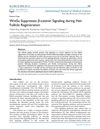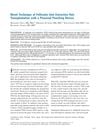 16 citations,
April 2017 in “Journal of Cosmetic Dermatology”
16 citations,
April 2017 in “Journal of Cosmetic Dermatology” Ficus carica leaf extract may help treat skin disorders by reducing inflammation and androgen effects in skin cells.
 16 citations,
January 2016 in “Journal of Investigative Dermatology”
16 citations,
January 2016 in “Journal of Investigative Dermatology” Mice without the IL-6 gene had more hair growth after injury due to higher activity of a related protein, Stat3.
 16 citations,
January 2016 in “International Journal of Medical Sciences”
16 citations,
January 2016 in “International Journal of Medical Sciences” Wnt5a slows down hair growth by blocking a specific pathway during hair regeneration.
 16 citations,
August 2014 in “Colloids and surfaces. B, Biointerfaces”
16 citations,
August 2014 in “Colloids and surfaces. B, Biointerfaces” Lipid-coated silica nanoparticles penetrate human skin more deeply than bare silica nanoparticles.
 16 citations,
January 2013 in “Indian Journal of Dermatology, Venereology and Leprology”
16 citations,
January 2013 in “Indian Journal of Dermatology, Venereology and Leprology” New treatments and early diagnosis methods for permanent hair loss due to scar tissue are important for managing its psychological effects.
 16 citations,
October 2008 in “Dermatologic Surgery”
16 citations,
October 2008 in “Dermatologic Surgery” The new powered hair transplant method is faster and damages fewer hairs than the manual method.
 16 citations,
January 2006 in “The Aging Male”
16 citations,
January 2006 in “The Aging Male” Hormone imbalances can cause skin diseases, and understanding these links is important for diagnosis and treatment.
 16 citations,
January 2001 in “Clinical and Experimental Dermatology”
16 citations,
January 2001 in “Clinical and Experimental Dermatology” Photodynamic therapy was effective in treating multiple scalp basal cell carcinomas with minimal side effects and good cosmetic results.
 15 citations,
October 2020 in “Journal of Investigative Dermatology Symposium Proceedings”
15 citations,
October 2020 in “Journal of Investigative Dermatology Symposium Proceedings” Platelet-Rich Plasma (PRP) could potentially help regrow hair in people with Alopecia Areata, but more research is needed to confirm its effectiveness.
 15 citations,
October 2020 in “European journal of pharmaceutics and biopharmaceutics”
15 citations,
October 2020 in “European journal of pharmaceutics and biopharmaceutics” Caffeine penetrates skin quickly through open hair follicles, but less through closed ones, with levels becoming equal after 22 hours.
 15 citations,
May 2020 in “Journal of Dermatological Treatment”
15 citations,
May 2020 in “Journal of Dermatological Treatment” PRP treatment increases hair density and thickness in androgenetic alopecia by 79%.
 15 citations,
January 2019 in “International Journal of Women's Dermatology”
15 citations,
January 2019 in “International Journal of Women's Dermatology” Early treatment helps stop hair loss in women of color.
 15 citations,
July 2017 in “PubMed”
15 citations,
July 2017 in “PubMed” Injecting a mix of human skin and hair cells into mice can grow new hair.
 15 citations,
November 2002 in “Cardiology in Review”
15 citations,
November 2002 in “Cardiology in Review” Cardiovascular drugs can cause various skin problems, so recognizing these reactions is important.
 15 citations,
July 1991 in “International Journal of Dermatology”
15 citations,
July 1991 in “International Journal of Dermatology” Laser Doppler velocimetry is a valuable noninvasive tool for skin blood flow research in dermatology.
 15 citations,
June 1964 in “Experimental Biology and Medicine”
15 citations,
June 1964 in “Experimental Biology and Medicine” Methotrexate can temporarily suppress certain immune responses without killing immune cells, potentially helping treat autoimmune diseases.
 14 citations,
May 2021 in “Marine Drugs”
14 citations,
May 2021 in “Marine Drugs” PDRN, derived from salmon sperm, shows promise in healing wounds, reducing inflammation, and regenerating tissues, but more research is needed to understand its mechanisms and improve its use.
 14 citations,
January 2021 in “Scientific Reports”
14 citations,
January 2021 in “Scientific Reports” Using micro skin tissue columns improves skin wound healing and reduces scarring.
 14 citations,
December 2020 in “Journal of Investigative Dermatology”
14 citations,
December 2020 in “Journal of Investigative Dermatology” Aging causes changes in the scalp that can affect hair growth and lead to older-looking hair in women.
 14 citations,
November 2020 in “International Journal of Molecular Sciences”
14 citations,
November 2020 in “International Journal of Molecular Sciences” Advanced therapies like gene, cell, and tissue engineering show promise for hair regrowth in alopecia, but their safety and effectiveness need more verification.
 14 citations,
February 2020 in “Stem Cells International”
14 citations,
February 2020 in “Stem Cells International” Umbilical cord cells safely improve healing in long-term nonhealing wounds better than a placebo.
 14 citations,
January 2016 in “Elsevier eBooks”
14 citations,
January 2016 in “Elsevier eBooks” Liposomes improve the delivery and effectiveness of cosmetic ingredients but face challenges like cost and stability.
 14 citations,
September 2015 in “Ophthalmic plastic and reconstructive surgery”
14 citations,
September 2015 in “Ophthalmic plastic and reconstructive surgery” Surgical removal of abnormal fat pads fixed the woman's eyelid issue caused by likely silicone injections.
 14 citations,
January 2014 in “International Journal of Dermatology”
14 citations,
January 2014 in “International Journal of Dermatology” Minoxidil with Korean red ginseng improves hair density and thickness more than minoxidil alone.
 14 citations,
May 2013 in “American Journal of Physiology-endocrinology and Metabolism”
14 citations,
May 2013 in “American Journal of Physiology-endocrinology and Metabolism” Removing myelin protein zero-like 3 in mice leads to better metabolism and resistance to obesity.
 14 citations,
January 2012 in “International Journal of Dermatology”
14 citations,
January 2012 in “International Journal of Dermatology” A woman got a rare condition called oleoma after cellulite treatment, which left scars even after treatment.
 14 citations,
September 2010 in “Annals of Plastic Surgery”
14 citations,
September 2010 in “Annals of Plastic Surgery” Hair restoration has evolved from surgery to drugs to potential gene therapy, with improved results and ongoing research driven by high demand.
 14 citations,
January 2008 in “Gene therapy”
14 citations,
January 2008 in “Gene therapy” Gene therapy shows promise for enhancing physical traits but faces ethical, safety, and regulatory challenges.
 13 citations,
January 2022 in “Stem cell reviews and reports”
13 citations,
January 2022 in “Stem cell reviews and reports” Mouse stem cells from hair follicles can improve wound healing and reduce scarring.
 13 citations,
May 2020 in “Journal of Plastic Reconstructive and Aesthetic Surgery”
13 citations,
May 2020 in “Journal of Plastic Reconstructive and Aesthetic Surgery” Botulinum toxin's effectiveness for treating scalp alopecia is not well-supported due to insufficient data.






























